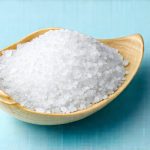Nausea is an incredibly common experience, ranging from a mild discomfort to debilitating sickness. Most people encounter it at some point in their lives—perhaps after eating something that didn’t quite agree with them, during travel, or even due to stress and anxiety. While the immediate impulse might be to seek sweetness or blandness, many individuals find surprisingly effective relief in salty foods. This seemingly counterintuitive response begs the question: why does a pinch of salt sometimes quell the churning feeling in your stomach? It isn’t merely anecdotal; there are physiological explanations at play that connect our bodies’ inherent mechanisms for maintaining balance with this peculiar comfort.
The reason isn’t always straightforward, and it doesn’t work for everyone or every type of nausea. The effectiveness can vary depending on the cause of the nausea itself. But for many experiencing mild nausea – stemming from things like motion sickness, morning sickness in early pregnancy, or even a slight upset stomach – salt can offer temporary relief. This isn’t about curing the underlying issue; it’s about temporarily modulating the body’s signals and restoring some degree of physiological equilibrium. Understanding this nuanced relationship requires delving into how our bodies regulate fluids, electrolytes, and sensory input.
The Role of Electrolytes and Fluid Balance
Nausea often accompanies disruptions in fluid and electrolyte balance. When we experience vomiting or diarrhea—even mild forms—we lose essential minerals like sodium, potassium, and chloride. These electrolytes are crucial for nerve and muscle function, including the processes within our digestive system. A deficiency can exacerbate feelings of sickness and discomfort. – Sodium plays a particularly important role here, as it’s vital in maintaining proper hydration levels.
Salty foods, by providing a readily available source of sodium, can help to replenish these lost electrolytes, though this is more pronounced with significant fluid loss. The body’s attempt to re-establish homeostasis (internal balance) after electrolyte imbalances might contribute to the feeling of relief. However, it’s crucial to emphasize that overconsumption of salt isn’t beneficial and can even worsen dehydration in some cases. It’s a delicate balance, and small amounts are usually what provide benefit.
Furthermore, sodium is critical for nerve impulse transmission. The vagus nerve, which plays a significant role in regulating nausea and vomiting, relies on proper electrolyte levels to function effectively. A disruption in these levels can send erroneous signals that contribute to the sensation of sickness. Restoring some balance through small amounts of salt may help calm this neural activity. If frequent burping accompanies your symptoms, it might be time for testing.
Sensory Input and the Brain’s Interpretation
Beyond purely physiological effects, our brains interpret sensory information in complex ways, and taste plays a significant role. Nausea isn’t simply a stomach issue; it’s a brain-mediated response. The brain receives signals from various sources—the gut, inner ear, eyes, and even emotional state—and integrates them to determine whether or not we feel nauseous. – Sometimes, the sensation of nausea can be amplified by psychological factors like anxiety or fear.
Salty tastes can act as a surprisingly strong sensory distraction. The sharp, distinct flavor engages neural pathways that might temporarily override or dampen signals coming from the digestive system. Think about how strongly taste impacts our perception of other sensations; a powerful flavor can effectively draw your attention away from discomfort. – This doesn’t eliminate the underlying cause but provides a temporary shift in focus.
It’s also theorized that salty foods can sometimes help “reset” the palate after experiencing unpleasant tastes or smells associated with nausea. If something initially triggered the nausea, a strong, contrasting flavor like salt might temporarily mask the lingering taste and reduce the triggering stimulus. This is similar to why some people find relief in consuming bland foods – they minimize sensory input that could further exacerbate the feeling of sickness. Understanding your gut can be helped by digestive tests.
Why Salt Crackers Are A Common Choice
Saltine crackers are perhaps the quintessential remedy for mild nausea, and their popularity isn’t accidental. They offer a combination of factors that make them particularly effective for many individuals. – First and foremost, they provide a small dose of sodium, as discussed previously.
– Secondly, the dry, bland texture is generally well-tolerated even by sensitive stomachs. The lack of strong flavors or aromas minimizes the risk of further irritation.
– Finally, the act of slowly nibbling on a few crackers can offer a gentle distraction and encourage saliva production, which helps neutralize stomach acid.
It’s important to note that while saltine crackers are often recommended, they aren’t a perfect solution for everyone. Individuals with certain health conditions – like high blood pressure or kidney disease – should be mindful of their sodium intake and consult with a healthcare professional before relying on salty snacks as a remedy. The goal is gentle relief, not an overabundance of salt. A GERD diet can also help manage related discomforts.
Motion Sickness & Salty Snacks
Motion sickness is a prime example where salty foods frequently offer relief. This type of nausea arises from a mismatch between what your eyes are seeing and what your inner ear (which controls balance) is sensing. When traveling in a car, boat, or plane, your inner ear detects motion, but your eyes might be fixed on something stationary inside the vehicle. – This sensory conflict triggers signals to the brain that can induce nausea and vomiting.
Salty snacks, like pretzels or potato chips (in moderation), can sometimes help mitigate this effect. The act of chewing stimulates saliva production, which may reduce discomfort. More importantly, the strong taste provides a sensory distraction that momentarily overshadows the conflicting signals from the inner ear. – It’s almost as if you’re giving your brain another, more dominant signal to focus on.
It’s also believed that small amounts of sodium can help regulate fluid balance during motion sickness, potentially reducing the severity of symptoms. However, it’s crucial to stay hydrated with water or electrolyte drinks alongside salty snacks, as dehydration can worsen motion sickness. If you experience stool changes after dietary restrictions, consult a professional.
When Salt Isn’t The Answer – And Seeking Medical Attention
While salt can offer relief for mild nausea in some cases, it is absolutely not a universal remedy and shouldn’t be relied upon for severe or persistent symptoms. There are many causes of nausea that require medical attention, and attempting to self-treat with salty foods could delay proper diagnosis and treatment. – If your nausea is accompanied by any of the following, seek immediate medical care:
- Severe abdominal pain
- High fever
- Inability to keep down fluids
- Blood in vomit
- Severe dizziness or weakness
Additionally, certain types of nausea are not likely to respond well to salty foods. For instance, nausea caused by food poisoning, migraines, or medication side effects may require different interventions. – It’s essential to identify the underlying cause of your nausea and address it accordingly. Salt is a temporary comfort measure; it’s not a substitute for proper medical evaluation and treatment. Remember that listening to your body and seeking professional help when needed are always the most important steps in managing your health. If you experience cramping after events with limited safe foods, look into safe food options. Finally, consider how slow mornings can help manage gut health long-term and potentially reduce nausea triggers.


















